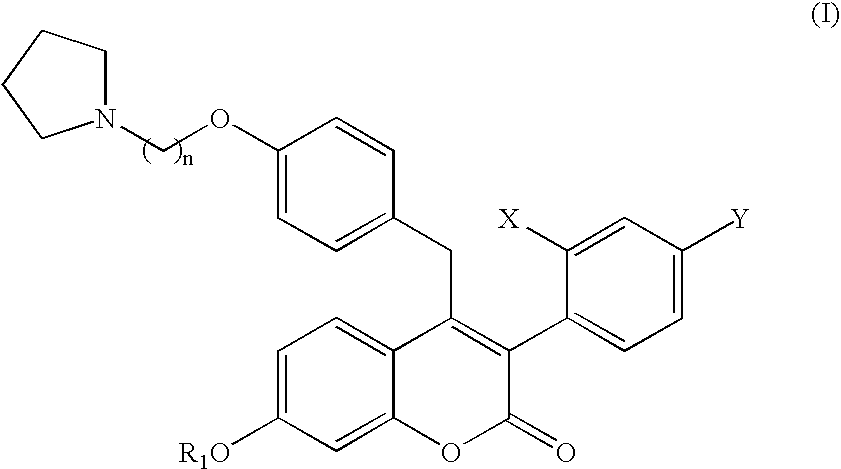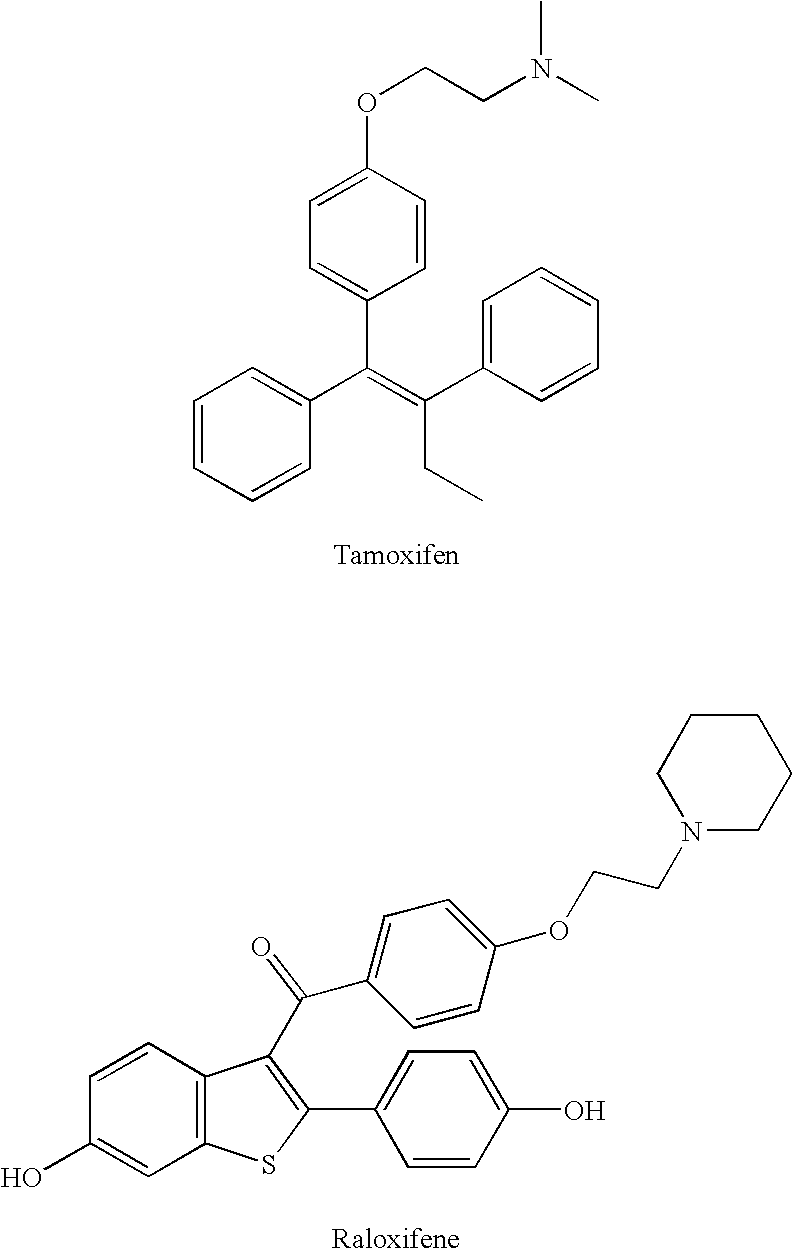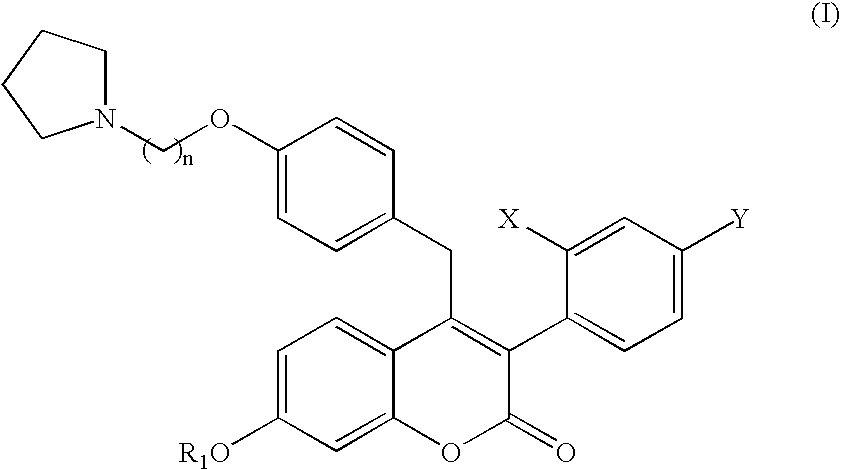4-((4-(2-pyrrolidinylethoxy)phenyl)methyl)-3-(4-(trifluoromethyl)phenyl)-7-hydroxychromen-2one, pharmaceutically acceptable salts thereof and methods of use therewith
a technology of trifluoromethyl and phenyl, which is applied in the field ofbenzopyranone compounds, can solve the problems of increased cancer risk, limited treatment, and fragile bones
- Summary
- Abstract
- Description
- Claims
- Application Information
AI Technical Summary
Benefits of technology
Problems solved by technology
Method used
Image
Examples
example 1
3-(2-chloro-4-trifluoromethylphenyl)-7-hydroxy-4-(4-(2-pyrrolidin-1-yl-ethoxy)-benzyl)-chromen-2-one
A. (2-Chloro-4-trifluoromethylphenyl)-acetic acid
[0107]
[0108] A solution of LiHMDS in toluene was prepared by the addition of n-BuLi (357 mL of a 1.6 M solution in hexanes, 571 mmol) to a cold (−78° C.) solution of HMDS (120.5 mL, 571 mmol) in toluene (700 mL). After 30 min, the reaction mixture was allowed to warm up to 10° C. over 1 h. The solution was then transferred via a cannula to a flame-dried, three-neck flask under N2 containing Pd2 dba3 (4.18 g, 4.57 mmol) and (2′-dicyclohexylphosphanylbiphenyl-2-yl)-dimethylamine (3.77 g, 9.59 mmol). The mixture was stirred for 15 min at 15° C., cooled to −1° C. and t-butylacetate (70.5 mL, 525.4 mmol) was added dropwise. After 10 min, 3-chloro-4-iodobenzotrifluoride (70 g, 228.4 mmol) was added and the reaction mixture was warmed up to 28° C. After stirring at this temperature for 1.5 h, the mixture was filtered through silica gel, usin...
example 2
3-(4-chloro-2-trifluoromethylphenyl)-7-hydroxy-4-(4-(2-pyrrolidin-1-yl-ethoxy)-benzyl)-chromen-2-one
A. (4-Chloro-2-trifluoromethylphenyl)-acetic acid
[0116]
[0117] A solution containing 4-chloro-1-iodo-2-trifluoromethylbenzene (14.98 g, 48.9 mmol), Bu3SnCH═CH2 (15.7 mL, 53.7 mmol) and (Ph3P)4Pd (2.26 g, 1.955 mmol) in anhyd toluene (200 mL) was deoxygenated using vacuum-N2 flush (3×). After refluxing the reaction mixture for 17 h, it was cooled to 0° C. and a solution of disiamylborane-methyl sulfide complex in toluene (˜1.95 M, 47 mL) was added dropwise over a period of ˜5 min. The disiamylborane-methyl sulfide complex solution was prepared by adding 2-methyl-2-butene (26 mL, 245 mmol) to a cold (0° C.) solution of borane-methyl sulfide complex (11.6 mL, 122.3 mmol) in anhyd toluene (25 mL) and stirring the resultant mixture at r.t. for 2 h. The bath was removed and the reaction mixture was stirred at r.t. for 3 h. After that period of time, the mixture was cooled to 0° C., EtOH (7...
example 3
3-(2,4-bis-trifluoromethylphenyl)-7-hydroxy-4-(4-(2-pyrrolidin-1-yl-ethoxy)-benzyl)-chromen-2-one
A. 3-(2,4-Bis-Trifluoromethylphenyl)-7-Hydroxy-4-(4-(2-Pyrrolidin-1-Y1-Ethoxy)-Benzyl)-Chromen-2-One
[0125]
[0126] This compound was prepared using the methodology described above in Example 1B. The resultant residue was purified using flash chromatography (silica gel, 1:1 to 3:2 Et2O:hexanes) to provide the title compound as a yellow foam showing: 1H NMR (300 MHz, CDCl3) δ 8.03 (s, 1H), 7.78 (d, 1H, J=8.0 Hz), 7.42 (d, 1H, J=8.8 Hz), 7.36 (d, 1H, J=8.0 Hz), 6.90 (d, 1H, J=2.5 Hz), 6.84 (d, 2H, J=8.5 Hz), 6.78 (dd, 1H, J=2.5, 8.8 Hz), 6.70 (d, 2H, J=8.5 Hz), 4.76 (s, 1H), 4.01 (d, 1H, J=16.0 Hz), 3.88 (s, 3H), 3.57 (d, 1H, J=16.0 Hz).
B. 3-(2,4-bistrifluoromethylphenyl)-7-methoxy-4-(4-(2-pyrrolidin-1-yl-ethoxy)-benzyl)-chromen-2-one
[0127]
[0128] This compound was prepared using the methodology described above in Example 1C. The resultant brown foam was purified using flash chromatography...
PUM
| Property | Measurement | Unit |
|---|---|---|
| body weight | aaaaa | aaaaa |
| temperature | aaaaa | aaaaa |
| temperature | aaaaa | aaaaa |
Abstract
Description
Claims
Application Information
 Login to View More
Login to View More - R&D
- Intellectual Property
- Life Sciences
- Materials
- Tech Scout
- Unparalleled Data Quality
- Higher Quality Content
- 60% Fewer Hallucinations
Browse by: Latest US Patents, China's latest patents, Technical Efficacy Thesaurus, Application Domain, Technology Topic, Popular Technical Reports.
© 2025 PatSnap. All rights reserved.Legal|Privacy policy|Modern Slavery Act Transparency Statement|Sitemap|About US| Contact US: help@patsnap.com



